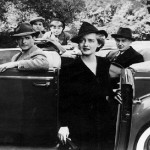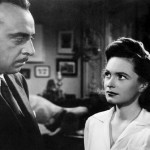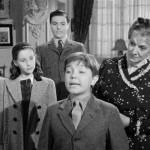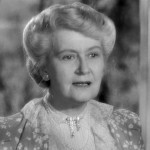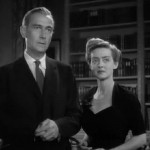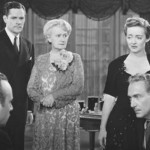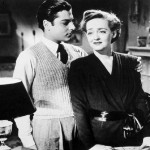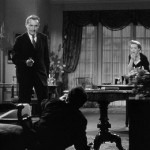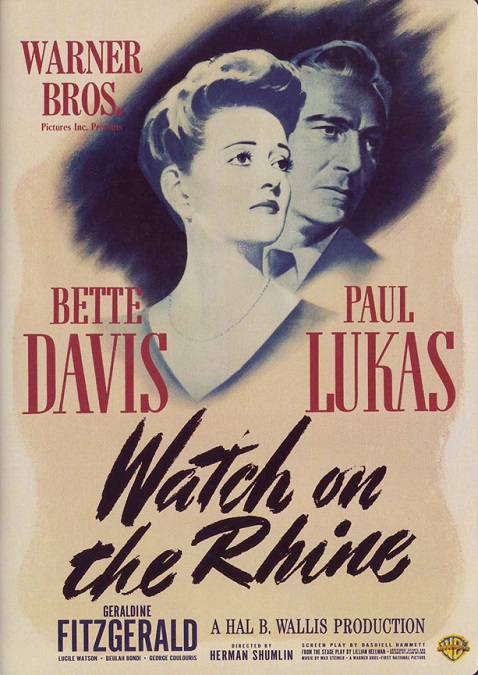
Watch on the Rhine – 1943
Bette Davis is back in this nominee, this time playing the part of Sara, an American woman married to German revolutionary, Kurt Muller, played by Paul Lukas. He is revolting against, you guessed it, the Nazis. Sara believes in his work so much that she is willing to sacrifice him to further the cause of freedom, not just for herself, but for all people. You can’t get much more patriotic than that. Buy war bonds!
Of course, that barely begins to cover the details of the plot, but it more than suffices for the overall scope of the film. It is just another example of an anti-Fascist propaganda movie. There was no subtlety in it, no finesse. It seems as if Hollywood, if not the world, was beyond subtlety at this point in history. There was nothing left but a heavy hand, bearing the unequivocal message that the Nazis needed to be put down.
Sara has been living abroad with her husband and their three children, one of whom was so annoying that I wanted to reach into the screen and slap him. I guess I should explain that. The three children, Joshua, Babette, and Bodo, were played by child actors Donald Buka, Janis Wilson, and Eric Roberts, respectively. The character of Bodo was walking the fine line of breaking the cardinal rule of filmmaking. Cute for the sake of cute is never cute. Never.
But this time I don’t blame the actor. It was the way the character was written. He was the youngest sibling, and the author was trying to make the point that the children had been robbed of their childhoods because of the dangerous nature of their father’s important work. So, Bodo went out of his way to be as grown-up as possible by using unusually articulate, grown-up dialogue. Sadly, it just came across as precocious and annoying. I wanted him to shut-up just as much as his brother and sister did.
The family is fleeing Europe and make it to the States under assumed names, where they move in with Sara’s super-wealthy mother, Fanny Farrelly, wonderfully played by Lucile Watson. Watson did a fantastic job as a well-meaning but self-centered busy body with more money than she knew what to do with. The actress was a dead-ringer for Patricia Routledge as Hyacinth Bucket in the popular British TV series, Keeping Up Appearances. Same look, same personality, same voice. If I didn’t know any better, I would have sworn it was her.
The conflict for the movie took the form of an evil Nazi sympathizer who, from the very beginning of the film, is established as the bad guy. He even got his own ominous music whenever he appeared on the screen, just in case the viewer was unsure of the character. He is Teck de Brancovis, played by George Coulouris. He is a weasel who is dishonest, shady, and unnecessarily arrogant. The character was neither deep nor complex. What he was, was predictable. He and his wife Marthe, played by Geraldine Fitzgerald, with whom he shares a loveless marriage, are staying at Fanny’s house as guests, though the film never really explains why they are staying there.
Kurt learns that a fellow rebel who had once saved his life from the Gestapo, nearly at the cost of his own, has been captured by the Germans. He has no choice but to return to Germany to attempt a rescue. To make a long story short, Teck finds out who Kurt really is, and blackmails him, threatening to turn him over to the Nazis, as he is on their most-wanted list. This would mean an automatic death sentence.
But the end of the film pleasantly surprised me. Kurt actually did something that made sense, though it did not follow the stereotypical Hollywood hero formula. He murders Teck. Not only does he kill the man in cold blood, he is completely honest about it with his wife, his mother-in law, and Sara’s brother, David, played by Donald Woods. And not only do they agree with his reasons, they help him get away with the crime. Logically, it is what should have happened. It was the only way to ensure his safety during his rescue mission.
But here’s the really interesting part – the Hayes Code tried to put their stamp on the film, saying that a man cannot get away with murder without being punished for it. They wanted the director, Herman Shumlin to include a scene, making it known Kurt eventually got killed by the Nazis, and therefore paid for his crime. But he actually defied the Hayes Code, and, with the support of Warner Brothers Studios, allowed Kurt to get away with it, saying that Teck was an evil character who deserved what he got. Of course, the actual killing took place off-screen.
Another interesting point about this film is that the role of Sara was really a small, supporting role. Kurt was the main character. Bette Davis was a huge name in Hollywood and took the small part because she really believed in the film’s message and pro-war point of view. She even tried to convince the studio to give her second billing, but that request was denied. The studio said that if they gave her top billing, more people would come see the film, which was the whole point of her participation in the first place.
